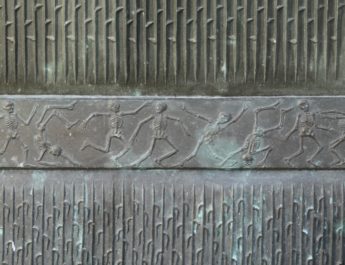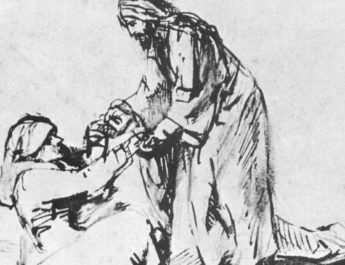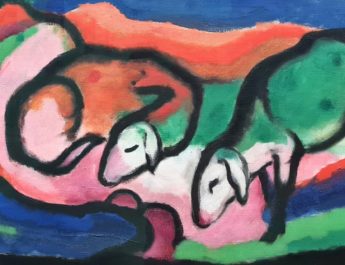Psalm 105:1-6, 23-26, 45b
Proper 17A
1 O give thanksA to the Lord;B callC on his name;D
A “give thanks” = yadah. From yad (hand). This is to throw one’s hands into the air in a gesture of praise. So, it is to praise, give thanks, or make a confession.
B “Lord” = YHVH. From havah (to be, become) or hayah (to come to pass, become, be). This is the name of the God of Israel, the self-existent and eternal one, the tetragrammaton. This pronunciation has been lost to time so “Lord” is generally used in its place.
C “call” = qara. This is to call or call out – to call someone by name. Also used more broadly for calling forth.
D “name” = shem. May be from sum (to put, place, set). This is name, fame, renown. A name was thought to indicate something essential about a person – something about their individuality. So, this word can also mean honor, authority, or character.
make knownE his deedsF among the peoples.G
E “make known” = yada. This is to know, acknowledge, advise, answer, be aware, be acquainted with. Properly, this is to figure something out by seeing. It includes ideas of observation, recognition, and care about something. It can be used causatively for instruction, designation, and punishment.
F “deeds” = alilah. From alal (to affect, do, practice, mock, overdo, glean, abuse, pain). This is a deed or action – something that causes an effect. It could be a wanton or shameful deed or an opportunity.
G “peoples” = am. From amam (to darken, hide, associate; creating shadows by huddling together). This is people or nation. It can be used specifically for a tribe, collectively of troops or armies, or figuratively to refer to a flock of animals.
2 SingH to him, sing praisesI to him;
tellJ of allK his wonderful works.L
H “sing” = shir. From shir (song, singer). This is to sing. It could also refer to one who is singing or leading others in song.
I “sing praises” = zamar. Perhaps from zamar (to trim or prune). This is making music. It is used specially of music to worship God. So, music with singing, singing praise, or singing psalms.
J “tell” = siach. From siach (musing, meditation, communication, babbling, prayer, contemplation). This is to muse, meditate, complain, sing, sigh, speak, or utter.
K “all” = kol. From kalal (to complete). This is all or every.
L “wonderful works” = pala. From pele (wonder, miracle, wonderful, marvelous thing). This is to be extraordinary, to arise, to be great or accomplish.
3 GloryM in his holyN name;
let the heartsO of those who seekP the Lord rejoice.Q
M “glory” = halal. This is to be clear – it originally referred to a sound, then a color. It was to shine and then make a show or boast then to rave. In a causative sense it came to mean celebrate, give glory, sing praise, or be worth of praise. Because of the celebratory nature of the word, it could also mean to give in marriage. This is where Hallelujah comes from.
N “holy” = qodesh. This is set apart and so sacred. God is different from us and so God is holy/set apart. Things we dedicate to God’s service are set apart for God and so they, too, are holy, etc.
O “hearts” = leb. May be related to labab (to encourage; properly, to be encased as with fat; used in a good sense, this means to transport someone with love; used in a bad sense, it can mean to dull one’s senses). This is the heart, courage, one’s inner self, the mind, or the will. Heart is only used in a figurative sense in the Old and New Testaments.
P “seek” = baqash. This is to seek, ask, desire, or request. It can be any kind of searching. It can also mean to worship or pray – implies a striving for.
Q “rejoice” = samach. This is to rejoice or be glad. Properly, it is to brighten up in a literal or figurative sense.
4 SeekR the Lord and his strength;S
seekT his presenceU continually.V
R “seek” = darash. This is seek, ask, inquire, care for. Generally it means following in pursuit or following as part of a search, which implies seeking or asking. Also used specially to mean worship.
S “strength” = oz. From azaz (to be strong, become fixed, be bold, prevail, be impudent; it means to be stout literally or figuratively. A Late Hebrew word). This is strength in the sense of force, majesty, praise, material and physical strength, the abstract notion of security. It can also speak of social or political power.
T “seek” = baqash. Same as “seek” in v3. See note P above.
U “presence” = paneh. From panah (to turn, face, appear). This is face in a literal or figurative sense. It could be face, presence, anger, respect. It can also be used of God to indicate divine favor or presence.
V “continually” = tamid. May come from a word that means to stretch. This word means an indefinite period of time. So, it could be regular or daily. It could also be constantly, continually, always, or perpetually.
5 RememberW the wonderful works he has done,X
his miraclesY and the judgmentsZ he has uttered,AA
W “remember” = zakar. This is to remember, to mark something so that it can be recalled, to be mindful of, to mention.
X “done” = asah. This is to make, do, act, appoint, become in many senses.
Y “miracles” = mopheth. Perhaps from yaphah (to be beautiful, decorate; root means being bright, which implies being beautiful). This is a wonder, miracle, symbol, sign, or omen.
Z “judgments” = mishpat. From shaphat (to judge, defend, pronounce judgment, condemn, govern). This is a verdict or formal sentence whether from humans or from God. It includes the act of judging as well as the place that judging takes place, the suit itself, and the penalty. Abstractly, this is justice, which includes the rights of the participants.
AA “uttered” = peh. Literally, “of his mouth.” This is mouth in a literal or figurative sense. So, more literally, it can be beak or jaws. More figuratively, it refers to speech, commands, or promises.
6 O offspringBB of his servantCC Abraham,DD
BB “offspring” = zera. From zara (to sow or scatter seed; conceive or yield). This is seed or sowing. It can, thus, mean a fruit, plant, sowing time, child, offspring, or posterity.
CC “servant” = ebed. From abad (to work, serve, compel; any kind of work; used causatively, can mean to enslave or keep in bondage). This is a servant, slave, or bondservant.
DD “Abraham” = Abraham. From the same as Abiram (exalted father, a high father – lofty) {from ab (father literal or figurative) + rum (rise, bring up, being high, extol, exalt, haughty; to raise in a literal or figurative sense)}. This is Abraham, father of many nations or father of a multitude.
childrenEE of Jacob,FF his chosen ones.GG
EE “children” = ben. From banah (to build or obtain children). This is son, age, child. It is son in a literal or figurative sense.
FF “Jacob” = Yaaaqob. From the same as aqeb (heel, hind part, hoof, rear guard of an army, one who lies in wait, usurper). This is Isaac’s son and his descendants. The name means heel-catcher or supplanter.
GG “chosen ones” = bachir. From bachar (to choose, appoint, try, excellent). This is chosen or choice. So, it implies excellence.
23 Then IsraelHH cameII to Egypt;JJ
HH “Israel” = Yisrael. From sarah (to persist, exert oneself, contend, persevere, wrestle, prevail) + El (God or god). This is Israel, meaning God strives or one who strives with God; new name for Jacob and for his offspring. This refers to the people and to the land.
II “came” = bo. This is to enter, come in, advance, fulfill, bring offerings, enter to worship, attack. It can also have a sexual connotation.
JJ “Egypt” = Mitsrayim. Perhaps from matsor (besieged or fortified place, bulwark, entrenchment; something hemmed in; a siege or distress or fastness); from tsur (to confine, besiege, to cramp). This is Egypt.
Jacob lived as an alienKK in the landLL of Ham.MM
KK “lived as an alien” = gur. Properly, this is the act of turning off the road for any reason. So, it means sojourning, becoming a guest. It can mean being fearful since one is outside of home territory. It can also mean dwelling, living, or inhabiting if one has turned off the root to encamp for a longer duration. This word is where the Hebrew “ger” comes from, which is the word translated “stranger” or “resident alien.”
LL “land” = erets. Root may mean to be firm. This is earth, ground, field land, or country.
MM “Ham” = Cham. 16x in OT. Perhaps from the same as cham (hot, warm); from chamam (to be warm, heat; to be hot in a literal or figurative sense; to mate). This is Ham, meaning “hot” or “protective wall.” See https://www.abarim-publications.com/Meaning/Ham.html
24 And the Lord made his people veryNN fruitfulOO
and made them strongerPP than their foes,QQ
NN “very” = meod. Perhaps from the same as uwd (firebrand, a poker). This is very, greatly, exceedingly. It can also mean vehemence, force, abundance.
OO “made…fruitful” = parah. This is to bear fruit, grow, be fruitful, increase. It is bearing fruit in a literal or figurative sense.
PP “made…stronger” = atsam. This is vast, numerous, strong. It can be to close one’s eyes, to make powerful, or to break bones.
QQ “foes” = tsar. From tsarar (to bind, restrict, narrow, be cramped, an adversary). Properly, this is a narrow or constricted place. Figuratively, it can be trouble, a pebble, an enemy, anguish, or distress.
25 whose hearts he then turnedRR to hateSS his people,
to deal craftilyTT with his servants.
26 He sentUU his servant MosesVV
and Aaron,WW whom he had chosen.XX
UU “sent” = shalach. This is to send out, away, send for, forsake. It can also mean to divorce or set a slave free.
VV “Moses” = Mosheh. From mashah (to pull out in a literal or figurative sense, to draw out) OR from Egyptian mes or mesu (child, son i.e. child of…). This is Moses – the one drawn out from the water, which is to say, rescued. If derived from the Egyptian, his name would share a root with Rameses and Thutmose.
WW “Aaron” = Aharon. Derivation uncertain. May mean “bearer of martyrs” OR be related to Ancient Egyptian ꜥḥꜣ rw (warrior lion) OR elevated, exalted, high mountain. This is Aaron. See https://en.wiktionary.org/wiki/Aaron
XX “chosen” = bachar. Related to “chosen ones” in v6. See note GG above.
45 thatYY they might keepZZ his statutesAAA
YY “that” = abur. From abar (to pass over, pass through, or pass by; cross over or to alienate; used for transitions). This is for, so that, on account of. Properly, it means crossed.
ZZ “keep” = shamar. This is to keep, watch, or preserve. It means to guard something or to protect it as a thorny hedge protects something.
AAA “statutes” = choq. From chaqaq (to inscribe, carve, or decree; a lawmaker; literally, this is engraving, but it implies enacting a law because laws were carved into stone or metal). This is statute, boundary, condition, custom, limit, ordinance It is something that is prescribed or something that is owed.
and observeBBB his laws.CCC
Praise the Lord!DDD
BBB “observe” = natsar. This is to watch, guard, protect. It can be positive – preserve or obey. It can be negative as conceal.
CCC “laws” = torah. From yarah (to throw, shoot, be stunned; to flow as water so figuratively to instruct or teach). This is law, instruction, teaching, or statute. It can also refer to the first five books of the Bible – the Torah.
DDD “Lord” = Yah. Related to “Lord” in v1. From YHVH (see note B above). This is Lord or God – a shortened form of God’s most holy name.
Image credit: “The Kneeler” by Fritz Nuss, 1968.




